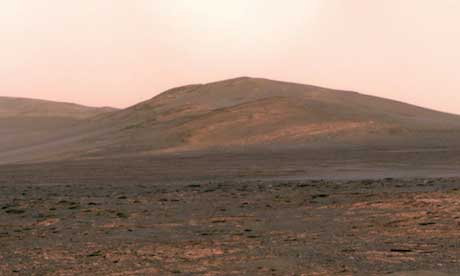 |
|
After almost 10 years exploring, NASA's Mars Exploration Rover Opportunity will now head for Solander Point. |
|
Opportunity has made one of its greatest scientific discoveries so far. Clay minerals in a rock called Esperance clearly indicate that neutral water flowed across the rock some time in the first billion years of its existence. The rock was found near Endurance Crater, and took seven attempts to analyse because it was partially covered in Martian dust. The clay minerals are similar to one called montmorillonite. Formed under the influence of neutral water, this is significant because neutral water, which is similar to household tap water, is thought to be much more conducive to the chemistry needed for the origin of life. Announcing the results, Steve Squyres, principal investigator for Opportunity, Cornell University, Ithaca, N.Y. said that, although they have talked in the past about finding water with Opportunity, really it was more like sulphuric acid. As Mars turned into the desert planet we see today, so the water became more acidic. This happened because of evaporation, which left a higher concentration of minerals in the remaining water – rather like reducing a sauce to make it richer. Neutral water dates from an earlier time on the planet, when it rained frequently bestowing a more Earth-like environment. Although a first for Opportunity, this is not the first time that neutral water has been found on Mars. In March, NASA's larger, younger rover Curiosity found evidence for 'drinkable' water in clay minerals in Gale crater. "It is really striking to me, how similar the stories are for the rocks at Gale and Endeavour crater," says Squyres, comparing the two findings. Opportunity is now heading for a 55-metre high outcrop called Solander Point. Averaging 50 metres per day, the team hope to get there before August. Winter is approaching on Mars. If Opportunity reaches Solander Point's sloping sides, the solar panels can catch more of the low winter Sun. This could give them enough power to drive during the winter months. In previous Martian winters, on flatter terrain, power levels have dropped so much that engineers have had to park Opportunity and wait for the cold weather to end. Images show that Solander Point displays layered terrain. These layers preserve a record of Mars's changing climate throughout the planet's history, which Opportunity can read. Analysing such layers is similar to Curiosity's mission at Mount Sharp in Gale crater. The longevity of Opportunity is astonishing. Designed to last for just 90 Martian days, it is now approaching its 3400th Martian day of operation. It has lasted almost 40 times longer than its design lifetime. It was launched on 7 July 2003 and landed on 25 January 2004. Considering the age of the rover, and the fact that its twin Spirit 'passed away' in 2010 during its fourth Martian winter, it seems prudent to start the celebrations now. Just in case. |
“機遇號”目前已實現了它的一項最偉大科學發現。一塊名為“獅石”(Esperance)的巖石里,其中的粘土礦物表明在這塊巖石最初的10億年中的某個時刻時在,曾有中性水從它上面流過。 這塊巖石在“持久”隕石坑(Endurance Crater)附近發現的 ,由于有一部分在火星塵埃下面,通過七次嘗試才將它分析出來。 這個粘土礦物與“高嶺石”(montmorillonite)礦物質很相似。這種礦物質在中性水的影響下形成,具有重要意義,因為與家用自來水相似的中性水被認為更加有助于生命起源所需的化學物質的產生。 “火星”號的首席研究員斯蒂夫斯.奎爾斯(steve Squyres)在紐約州伊薩卡市的康奈爾大學(Cornell University)宣布研究結果時說,雖然過去他們宣布過“機遇”號發現水的事情,而事實上更像是硫酸。 由于火星變成了我們今天所見到的沙漠星球,因此,水的酸性更強。這是由于蒸發才公這種現象,而蒸發把高濃度礦物質留在了剩余的水中,這有點像醬油蒸發。變得更加濃稠。 中性水可以追溯到火星早期,那時火星上頻繁地下雨,那時的大氣環境與地球現在的環境很相近。 雖然這是“機遇”號第一次在火星上發現水,但這卻不是水第一次在火星上發現。在今年的三月份,美國宇航局的體積更大,設備更新的“好奇”號(Curiosity)火星車在蓋爾隕石坑(Gale crater)的軟土礦物中發現了可飲用水的證據。通過比較兩次發現,斯奎爾斯說:“這真的令我很震驚,發生在蓋爾隕石坑和持久隕石坑的事情是多么的相似啊。” “機遇”號現在正朝著五十五米高的被叫做索蘭德高地的一塊露出地表的巖石進發。它平均每天能前進五十米,所以它很有可能在八月前到達目的地。 火星上的冬天正在悄然來臨。如果“機遇”號能到達索蘭德高地(Solander Point)的斜坡,那么在冬天太陽電池板就能從高度角較低的太陽中吸收更多的能量。這就能給它們充足的能量在冬天的幾個月里繼續前行。 在火星上之前度過的幾個冬天,“機遇”號都處于平坦地帶,而功率電平降到了很低,工程師們不得不讓“機遇”號停下來,等待著寒冷天氣的結束。 圖片顯示索蘭德高地呈現出層狀地形。這些“機遇”號能研究的層狀結構保存了火星整個歷史進程中變化的氣候的記錄。“機遇”號分析這些層狀結構的任務和“好奇”號在蓋爾隕石坑中夏普山上的使命是相似的。 “機遇”號的壽命是驚人的。最初它被設計在火星上停留的時間僅僅是九十天(火星每天比地球長40分鐘),而現在它即將要迎來它在火星上工作的第3400個日子。 “機遇”號在2003年7月7日發射升空,并于2004年1月25日著陸火星,已運行了接近四十倍于設計壽命的時間。 鑒于它現有的壽命和它的“孿生”火星車——“勇氣”號在2010年即“勇氣”號在火星上的第四個冬天期間“去世”。現在來進行慶祝似乎是很謹慎的。畢竟要以防萬一嘛。 (翻譯:袁凌子 編輯:Julie) |